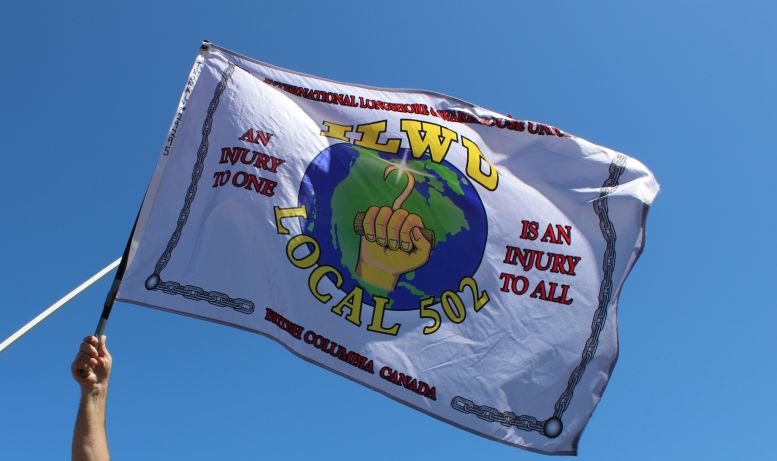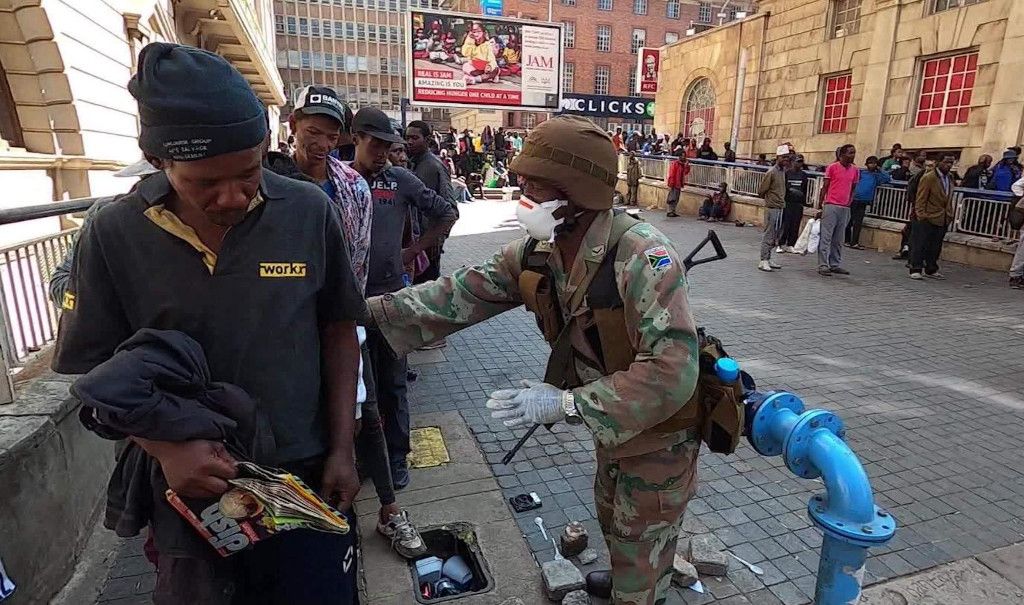Written by Socialist Alternative members in solidarity on the picket line.
On Friday, August 4, BC’s longshore workers voted to accept a new agreement. This follows more than a month of strikes, bargaining, and the members rejecting two earlier tentative agreements. Behind it all was a major attempt by the bosses, backed by the federal Liberal government, to weaken the union.
From the very beginning, before the strikes began on July 1, International Longshore and Warehouse Union Canada (ILWU) made it very clear that job security was a major concern. Until ILWU voted for a strike, the employers dragged their feet on negotiating. Once the talks began, the employers largely ignored this issue.
Even before the strike, the employers had tried to smear the longshore workers with talk about the inefficiency of the Port of Vancouver. This report ignored that many of the problems were due to mismanagement, COVID disruptions and the disastrous floods of November 2021, driven by climate change, that for a time cut all road and rail routes out of Vancouver.
The employers are awash with money, having made record profits during COVID. They were safe in their big offices, while longshore and other “essential” workers risked their health and lives to keep society moving.
From the start of the strike the employers, represented by the BC Maritime Employers Association (BCMEA), wanted the government to intervene rather than have real negotiations. They walked away from negotiations multiple times. As early as July 3, the BCMEA issued a statement saying that a “continuation of bargaining at this time is not going to produce a collective agreement.” Their aim all along was to get the government to block the unions’ rights.
As Rickey Baryer, Vice-President of ILWU Local 500, stated, “It was made quite apparent by the BCMEA that they had no intention of showing its workers any respect by coming to the table to make a deal.”
In all the BCMEA’s media releases and propaganda they highlighted the improved pay offer but did not point out it can take a decade or more of being a casual, on much lower pay, to become a full member of ILWU. One of the concerns of the ILWU members is that skilled trades are reluctant to become longshore workers because it takes so long as a casual. The pay also includes working shifts all year round in all weather and in dangerous conditions. Crucially, the BCMEA’s and government mediator’s initial proposals did not address the real concerns of the membership. This reflects the bosses’ outlook that money is what is important, and they care little for the long-term, whether it is jobs or even climate change.
It took over a month to reach a settlement because the employers were dragging their feet on recognizing the importance of job security.
Federal Interference
The screams by big business for the government to intervene to end the strike were incessant. The Liberals, as expected, decisively intervened multiple times on the side of the employer but did not use back-to-work legislation. There were many public criticisms of the union, but nothing directed at the employers.
O’Regan, the federal Liberal’s Labour Minister, on July 11 instructed the federal mediator to present terms for a settlement of the strike. On July 12, he gave ILWU and the employers (BCMEA) 24 hours to accept or reject his proposals, which leaned to supporting the employer on three out of four points. He proposed a four-year contract, which the employers wanted; there were no words on protecting jobs from automation, or increased protection from the employers’ use of non-ILWU workers to do maintenance, especially on new machinery. The contracting out of maintenance does not save the employers money, but it can weaken the union and it risks making an already dangerous job even more dangerous. On one issue — money — the proposals were somewhere between the bosses and the workers. Hardly even handed!
In response, ILWU suspended the pickets while it decided on the tentative agreement (TA). When the delegates’ caucus, a larger and more representative body than the bargaining committee, rejected the TA the union announced that the strike was restarting. Within a few hours the government had declared it an illegal strike, although the strike had been called by a 99.24 percent vote and had never been ended. In response, ILWU again suspended the strike.
A second offer was put to the membership and was rejected on Friday, July 28. Over the weekend there was a flurry of meetings alongside further government threats to intervene.
On August 1, it was announced there was a new tentative agreement that seemed to finally have addressed the workers concerns about jobs. This offer was again to put to the membership for a vote with a recommendation to support.
Again, the government (and its tool, the Canada Industrial Relations Board [CIRB]) interfered in the union’s internal democratic structures. A leader can change their mind after discussions with members. But CIRB says they can’t. The CIRB chair, Ginette Brazeau, ordered the ILWU to send its members a letter signed by all five local presidents endorsing the deal. The letter also states, “The Board reminds ILWU leadership that it can be considered an unfair labour practice for union leadership to unanimously support a settlement agreement and subsequently change its position through the ratification process.”
The government and the employers have a real problem with union democracy. They don’t think union members should have a say in their own contracts. Of course, this reflects the class outlook of the employers and their wish for how society should be run. The capitalists celebrate “their democracy,” the limited right to vote every four years, to be followed by four years of people’s dormancy. In contrast, they sneer or deride union or workers’ democracy, which involves members discussing and voting for or against strike mandates and tentative agreements. Voting to ratify or reject the wages and working conditions outlined in a contract is fundamentally democratic. It allows workers an element of control over their own working lives. Of course, socialists want to greatly extend this democracy to cover all areas of work as well as in the community.
Brazeau’s statement may have been in response to a Facebook post by Rickey Baryer, in which he said of the earlier deal rejected by the members that it had been “forced” on the union by the government and would have been “the beginning of the end of our very existence.”
On August 4, ILWU announced that 75 percent of the members has accepted the latest agreement.
Even after the strike, the bosses are still pushing to change the laws. The Canadian Federation of Independent Business has said that ports should be designated as an essential service, and so make it easier for the government to interfere in negotiations. They also want the government to allow “replacement workers,” — scabs.
Throughout the dispute the bosses, backed by the government, were trying to weaken the ILWU and undermine the workers’ jobs. If, as far as Socialist Alternative knows, the new agreement has stronger language on job protection, the union’s membership has successfully resisted the employers’ attacks.
ILWU Reflection
It seems that the ILWU membership successfully resisted the employers’ plans to weaken their union. This is a significant achievement along with winning wage increases that cover the increased cost of living.
However, the leadership will need to reflect on its initial recommendations of the employers’ offers that were rejected twice, once by the delegate caucus and once by the membership. ILWU had impressive unity in the 99.24 percent strike vote. One in four members voted to reject the final offer, probably because they thought a better deal was possible.
There is no doubt the leadership was under enormous pressure from the government, as Baryer stated, “forced” to recommend the earlier offer. As Socialist Alternative outlined, ILWU had the power to resist the government’s threats. It is not realistic to find thousands of skilled scab longshore workers. In many cases, where unions have resisted back-to-work legislation, they have won a better contract.
Imposed contracts and back-to-work legislation can easily backfire on the bosses as workers become more determined to stand up for their rights. There are many ways workers can slow down the job and generally counter the bosses’ attacks.
Public Democracy
A lesson for every worker and socialist is that the ports should not be run by big business. The ports’ lands are publicly owned but are operated by private businesses that put profits before jobs, safety and community well-being. Publicly owned ports with democratic decision-making by the workers in the ports and who use the ports and the wider society would be a much better way to run them. Instead of super-profits for a few, benefits would be shared more widely, and safety, employment and environmental concerns would be important factors for decisions.
The government’s intervention in favour of the bosses is a warning to all workers and unions. At some time, the entire labour movement will have to take a stand to counter the bosses and government actions. The right to strike is fundamental for the working class, won in hard struggles.


